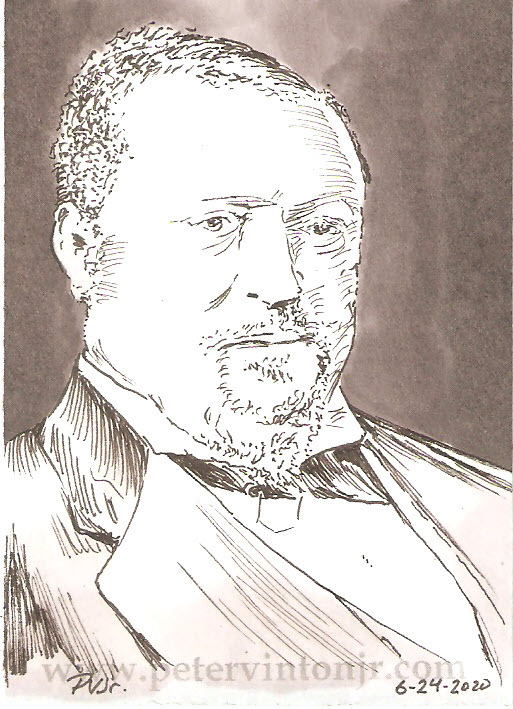
An ongoing illustrative history study
This piece originally posted 8/3/2020
Prelude | 20 | 21 | 22 | 23 | 24 | 25 | 26 | 27 | 28 | Email |
|---|
"The novelty of my position compels me to cultivate and exhibit my honourable associates a courtesy that would inspire reciprocal courtesy."
Blanche Kelso Bruce was born a slave in Farmville, VA sometime in 1841, secretly educated to read and write by his then-master. At the outset of the Civil War he fled to Kansas and later to Mississippi; during Reconstruction he became a successful cotton plantation owner in his own right, and eventually pursued the unthinkable: the life of an elected official. Beginning as the sheriff and tax collector of Bolivar County, MI, from 1872-1875, he was ultimately elected as a Republican to the United States Senate on February 4, 1874, and served from 1875 to 1881 --the very first African-American to serve a full term in that body.
Bruce was not the first-ever elected black Senator (that honour fell to his predecessor, Hiram Revels). Bruce's time in the Senate was of course contentious; among many insults and indignities, his fellow Mississippi Senator, James Rostrum, refused to accompany his new colleague to the rostrum to take his Oath of Office. Rather than let the indignity endure, New York Senator Roscoe Conkling got up from his seat and accompanied Bruce the rest of the way to the front of the Chamber.
Bruce's sole term in the Senate was not wasted --he used his post to advocate civil rights for blacks, Native Americans, Chinese immigrants, and --significantly-- former Confederates. (One date of particular significance during that time, on February 14, 1879, owing to the Senate tradition of rotating presiding officers, Bruce found himself presiding over a floor session. Little more than a footnote, to be sure, but nevertheless another first for an African-American.)
The end of the Reconstruction-era military government in Mississippi effectively ended Republican control over that state's legislative process, and Bruce finished out his single Senate term in 1881. However his time in public service was not yet done --before his death in 1898 he would serve as President Garfield's registrar of the U.S. Treasury, President Harrison's recorder of deeds for the District of Columbia, and again registrar of the U.S. Treasury under McKinley. He even received 11 delegate votes for Vice President at the Republican national convention of 1888.
Next page - Lesson 25: Zora Neale Hurston